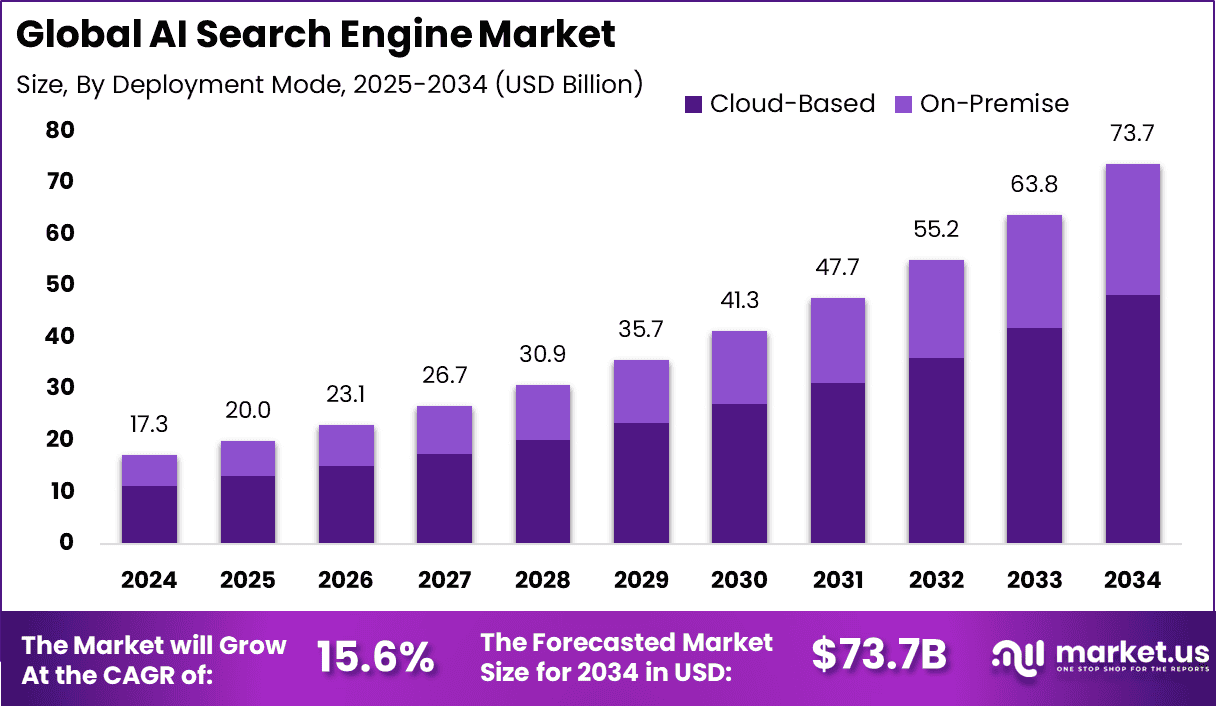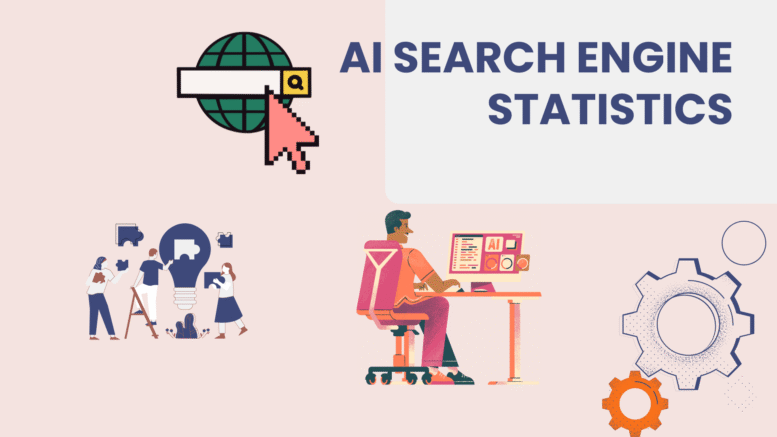Introduction
AI Search Engine Statistics: An AI search engine is a smart search tool that uses artificial intelligence to understand and interpret user queries beyond just matching keywords. It leverages technologies such as natural language processing (NLP), machine learning, and large language models to analyze the context, intent, and meaning behind what a user asks. This results in more relevant, personalized, and precise search results compared to traditional search engines, which mainly focus on exact keyword matches.
In 2025, AI-powered search engines have gained significant traction in user adoption and impact on online search behavior. About 21% of U.S. internet users access AI tools like ChatGPT and similar platforms over ten times a month, marking a jump from 8% in 2023 to 38% in 2025, indicating strong growth in daily usage. Despite this rise, traditional search engines such as Google continue to dominate, with about 95% of Americans still using them monthly.
AI Overviews, which are AI-generated summaries within search results, now appear in approximately 47% of Google search results, and around 16% of all Google searches in the U.S. feature these AI-enhanced snippets. These AI results influence user interaction by reducing clicks to websites by about 34.5%, as users obtain answers directly from the AI summaries. AI-generated search results rely heavily on fresher content, with around 80% of sources cited being newer than those in traditional organic results, which highlights changing content visibility dynamics.
Top Editor’s Choice
- The Global AI Search Engine Market is expected to grow from USD 17.3 Billion in 2024 to nearly USD 73.7 Billion by 2034, at a 15.6% CAGR.
- In 2024, North America led with 31.9% share, generating USD 5.5 Billion in revenue.
- 58.5% of U.S. Google searches now end in zero clicks, as AI responses satisfy user intent instantly.
- 45% of U.S. adults used an AI-powered search engine at least once a month in 2024.
- Perplexity.ai grew to 30 million monthly users by Q1 2025, up from 10 million in mid-2023.
- 27% of enterprises worldwide integrated AI search tools into internal knowledge bases.
- 51% of Gen Z prefer AI search tools over traditional search for academic queries.
- In India, over 60% of AI search traffic came from mobile devices in 2024.
- 38% of users reported higher trust in AI search results than in traditional engines.
- 22% of online shoppers now start product research with AI-powered search engines.
- In the EU, the AI search user base grew 46% between Q2 2023 and Q2 2024.
- You.com reached 8 million monthly users in 2024, up from 2 million in early 2023.
- 13% of surveyed users said they had completely replaced Google with an AI search tool.
- 41% of AI search users also engage with chat-based AI tools like ChatGPT daily.
- 19% of AI search usage occurs through browser extensions or embedded tools.
- 63% of new AI search users in 2024 were first-time adopters of any AI technology.
Interest over time
- Search Interest Trend: Interest in “AI Search Engine” rose steadily from early August, peaking around August 17–18, before dropping sharply after August 20 and stabilizing at a lower level.
- Peak Interest: The highest point reached was close to 100 interest score, indicating maximum global attention during mid-August.
- Decline Phase: After the peak, interest quickly declined to around 25–30, where it remained stable for the rest of the month.


(reference: trends.google.com)
- Regional Leadership: Singapore recorded the strongest search interest, scoring 100 on the index.
- Strong U.S. Presence: The United States followed closely with a 96 score, showing almost equal interest to Singapore.
- Other Key Regions: India and Canada also showed significant activity, with Canada recording a 48 score, indicating moderate but steady interest.
- Global Spread: The heat map highlights active searches in North America, parts of Europe, and Asia-Pacific, with concentrated adoption in tech-forward markets.
Suggested Reading: AI Agent Statistics: Trends Shaping the Future of AI
Market Size
- Large Enterprises dominate adoption, holding 64.9% share, reflecting their focus on scaling AI search integration.
- Natural Language Processing (NLP) leads technology use, driving intelligent query handling and contextual results.
- Cloud deployment accounts for 65.6% of adoption, underscoring demand for flexibility and scalability.
- Retail & E-commerce is the top end-use sector, with AI engines enhancing personalized shopping and customer experience.

(Image Credit: Market.us)
Adoption & Usage Trends
- 45% of U.S. adults used AI-powered search engines monthly in 2024.
- Perplexity.ai surged to 30 million users by Q1 2025, up from 10 million in mid-2023.
- 27% of enterprises globally integrated AI search into internal systems.
- 51% of Gen Z preferred AI tools for academic queries.
- In India, 60% of AI search traffic came via mobile, while 38% of users trusted AI results more than traditional search.
Marketing & Customer Engagement
- 61% of marketers reported AI boosted organic traffic.
- 72% identified AI as central to future marketing strategies.
- By 2025, nearly 95% of customer interactions will be managed without humans.
- By 2024, 80% of search queries projected to be handled by AI agents.
- AI-driven personalization is lifting conversion rates by up to 20%.
SME Adoption
- 55% of smaller businesses plan to increase AI investment in search marketing.
- Rising adoption is reshaping consumer behavior and enterprise strategies, accelerating the global shift toward automated, intelligent engagement.
User Behavior in AI Search
- 58.5% of Google searches end in zero clicks (Break the Web), showing how user intent is often satisfied without visiting websites.
- AI answer CTRs remain below 1%, signaling that while engagement is growing, actual clicks are limited.
- 96% of AI search discussions take place on X (Twitter), highlighting where real-time sentiment and feedback are concentrated.
- 65.9% of users say citations increase trust, yet only 27% click them regularly.
- 48.8% do not verify sources if the AI’s response “sounds right,” raising credibility and misinformation concerns.
Who is Using AI Search
- 70% of AI users are Gen Z or Millennials, confirming its strong adoption among younger demographics.
- 81% prefer AI tools over human assistance for information retrieval.
- By 2025, nearly 90% of U.S. hospitals are expected to adopt AI search for clinical and administrative use.
Google vs AI Search
- Google maintains an 89.57% global market share (StatCounter).
- AI search traffic is increasing rapidly but is still below 15% globally.
- AI platforms now handle over 2 billion queries per day, narrowing the gap.
Top Platforms Comparison
- Perplexity recorded 524% growth in 2024, now handling 780M queries/month.
- ChatGPT processes 1.1B queries daily with 500M weekly users, leading in scale.
Comparative strengths:
- Perplexity → best for citations.
- ChatGPT → best for depth.
- Google → best for reach.
Top AI Search Engines
| Platform | Launch Date | Key Feature | Current Status |
|---|---|---|---|
| ChatGPT Browse | March 2023 | Real-time web search | ~500M weekly active users |
| Bing Copilot | February 2023 | GPT-4 integration | 40M+ daily users |
| Perplexity AI | August 2022 | Citation-first answers | $9-18B valuation |
| Google AI Overviews | May 2024 | Generative search snippets | 89.57% global search market share |
(reference data: allaboutai.com)
Enterprise AI Search Tools
- 41% of Fortune 500 companies use enterprise AI search platforms, showing strong adoption among large corporations.
- 68% of companies with over 10,000 employees deploy AI search to reduce internal query time.
- 400+ enterprises use Glean’s AI search platform as of 2025.
- 74% of companies report higher employee productivity after implementing AI search.
- AI search reduces document retrieval time by 38% in large enterprises.
- 53% of HR departments use AI search to index and retrieve candidate records.
- 65% of customer support teams deploy AI search to cut resolution times.
- 29% of enterprise AI search deployments include proprietary LLMs trained on internal data.
- 87% of companies integrate AI search with CRM platforms.
- AI search saves an average of 23 hours per employee annually in finding information.
- AI search tools reduce knowledge worker onboarding times by 18%.
Investment Statistics
- Venture capital (VC) funding in AI search grew 127% year-over-year from 2023 to 2024.
- In 2024, 58% of AI search VC funding was allocated to LLM-driven (large language model) startups.
- Perplexity.ai raised $73.6 million in Series B funding during 2024.
- Investment in AI search privacy technology increased 2.3x in 2024.
- Academic AI search tool investment is forecasted to grow 5x by 2026.
AI for Marketing Strategies
- 30% ROI Boost: Companies using AI in search marketing report an average 30% increase in return on investment, highlighting its financial impact.
- 65% Integration Rate: Around 65% of digital marketers have already integrated AI into their SEO strategies, showing strong adoption across the industry.
- 35% Higher Efficiency: AI-powered keyword research tools improve efficiency by 35% compared to traditional methods, streamlining campaign execution.
- 55% SEO Adoption: About 55% of website owners use AI tools to optimize SEO and search visibility, underlining its growing role in digital competitiveness.
Benefits and Applications
AI search engines offer several crucial benefits:
- They provide deeper understanding and better relevance by interpreting conversational queries instead of just keyword hits.
- They adapt over time through learning, offering more personalized and dynamic results.
- They handle structured and unstructured data, useful in industries like e-commerce, healthcare, finance, and customer service.
- They improve efficiency by automating routine search tasks and supporting complex information retrieval from large datasets.
References
- https://www.allaboutai.com/resources/ai-statistics/ai-search-engines
- https://seosandwitch.com/ai-search-engine-statistics/
- https://gitnux.org/ai-in-the-search-industry-statistics/
- https://market.us/report/ai-search-engine-market/

